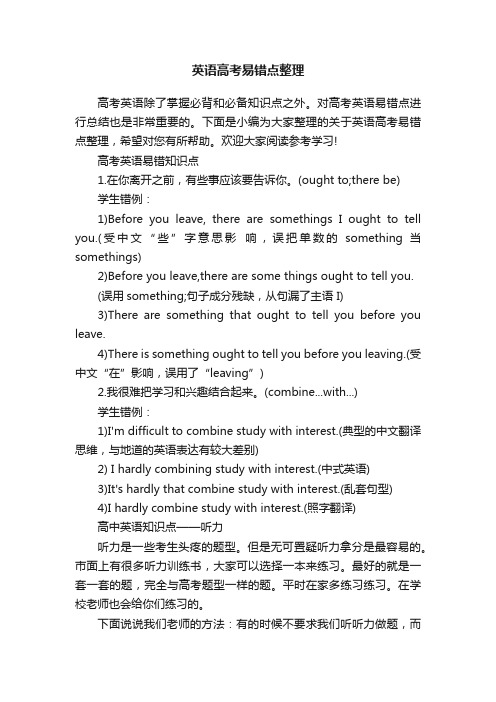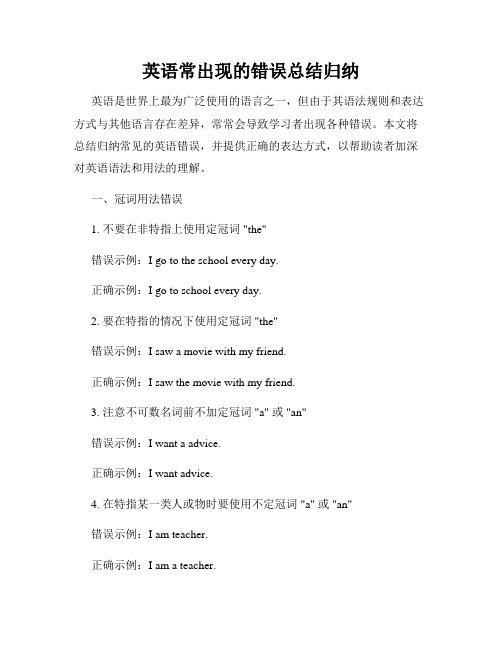高中英语易错知识点总结(最新最全)
高考英语易错知识点汇总

高考英语易错知识点汇总立刻就要高考了,高考考生想知道英语中有哪些知识点是简单消失错误的吗?以下是由我整理高考英语易错知识点的内容,盼望大家喜爱!高考英语易错点1、名词的单复数形式的误判What do you think the should do first?They should learn to take as well as share rights in life.A. grown-up; responsibilityB. growns-up; responsibilityC. grown-ups; responsibilitiesD. growns-ups; responsibilities错因分析:有些考生以为grown是复合名词的中心词,其复数形式应当在grown后面加-s;另一方面认为responsibility是不行数名词,没有复数形式,从而错选B.其实,grown-up没有中心名词,其复数形式应当在up后面加-s;同时依据语境可知,responsibility指义务,该单词作"义务,职责'讲时,可作可数名词或不行数名词,故正确答案选C.复合名词的复数形式一般在中心名词后面加-s,如:looker-on lookers-on, son-in-law sons-in-law;但是当复合名词没有中心名词时,其复数形式是在最终的词后面加-s,如:grown-up grown-ups; go-between go-betweens.高考英语易错点2、名词的格的误用Look! This is .Very beautiful. When did she take it?A. my mothers pictureB. my mother in the pictureC. a picture of my motherD. a picture of my mothers错因分析:考生可能受汉语思维的影响,错选A或B;也可能受英语双重全部格的影响,错选D.依据语境可知,正确答案选C.my mothers picture,意为"我妈妈所拥有的照片',暗含"照片上不肯定是我妈妈'; a picture of my mothers意为"我妈妈所拥有的照片中的一张',同样,暗含"照片上不肯定是我妈妈'; a picture of my mother 意为"我妈妈的照片(照片中是妈妈)';my mother in the picture意为"照片中我的妈妈',暗含"不是真实的妈妈'。
英语高考知识点总结易错点

英语高考知识点总结易错点英语高考是一项重要的考试,对于学生来说,掌握好高考所涉及的英语知识点是至关重要的。
然而在备考过程中,总会有一些易错点容易被忽视。
接下来,我们将总结一些常见易错点供大家参考。
一、单词拼写和用法错误1. 单词拼写错误:英语单词拼写准确无误是必要的。
在书写单词时,需要注意各个字母的顺序以及拼写规则,不能随意增加、省略或错换字母。
可以通过反复默写、记忆单词的词根、前缀和后缀等方法来提高单词拼写的准确性。
2. 词性和用法错误:在英语中,很多单词有不同的词性和用法,容易造成混淆。
例如:"play"可以是动词,也可以是名词;"speak"是及物动词,后面要加宾语;"hard"可以是形容词,也可以是副词。
因此,需要注意通过阅读和积累,掌握单词的正确词性和用法。
二、语法错误1. 时态和语态错误:在考试中,时态和语态错误是常见的语法问题。
时态问题主要表现在目前时态、过去时态、将来时态的混用,需要根据语境进行正确选择;语态错误则表现在主动语态和被动语态的错误使用,需要根据句子结构和意思进行正确变换。
2. 主谓一致错误:在英语中,主语和谓语动词需要保持一致。
例如:"The book"是单数名词,谓语动词要使用单数形式,不能误用复数形式。
在句子中,注意主语和谓语动词的一致性,避免主谓不一致的错误。
三、句子结构错误1. 句子成分缺失或多余:在句子构建过程中,需要注意各个句子成分的完整性和合理性。
例如:主语、谓语、宾语等各个成分是否齐全;句子中是否存在多余的修饰词或从句。
要通过学习和积累,了解句子结构的基本规则,并进行适当的练习和仿写。
2. 并列句和复合句的使用问题:在高考题型中,常常涉及到并列句和复合句的使用。
并列句要注意主句和从句之间的关系,是否存在平衡和衔接;复合句要注意主句和从句之间的时态、语态、连词等问题,确保句子结构的正确性。
英语高考易错点整理

英语高考易错点整理高考英语除了掌握必背和必备知识点之外。
对高考英语易错点进行总结也是非常重要的。
下面是小编为大家整理的关于英语高考易错点整理,希望对您有所帮助。
欢迎大家阅读参考学习!高考英语易错知识点1.在你离开之前,有些事应该要告诉你。
(ought to;there be)学生错例:1)Before you leave, there are somethings I ought to tell you.(受中文“些”字意思影响,误把单数的something 当somethings)2)Before you leave,there are some things ought to tell you.(误用something;句子成分残缺,从句漏了主语 I)3)There are something that ought to tell you before you leave.4)There is something ought to tell you before you leaving.(受中文“在”影响,误用了“leaving”)2.我很难把学习和兴趣结合起来。
(combine...with...)学生错例:1)I'm difficult to combine study with interest.(典型的中文翻译思维,与地道的英语表达有较大差别)2) I hardly combining study with interest.(中式英语)3)It's hardly that combine study with interest.(乱套句型)4)I hardly combine study with interest.(照字翻译)高中英语知识点——听力听力是一些考生头疼的题型。
但是无可置疑听力拿分是最容易的。
市面上有很多听力训练书,大家可以选择一本来练习。
最好的就是一套一套的题,完全与高考题型一样的题。
2024年高考英语易错题(新高考专用)易错点07动词的时态和语态(4大陷阱)

易错点07 动词的时态和语态目录01 易错陷阱(4大陷阱)02 举一反三【易错点提醒一】一般现在时、一般过去时和现在完成时易混易错点【易错点提醒二】一般过去时和过去完成时易混易错点【易错点提醒三】现在完成时和过去完成时易混易错点【易错点提醒四】主动语态与被动语态易混易错点03 易错题通关易错陷阱1:一般现在时、一般过去时和现在完成时易混易错点。
【分析】【高考链接】(2023年浙江卷1月)The large siheyuan of these highranking officials and wealthy businessmen often________ (feature)beautifully carved and painted roof beams and pillars(柱子).【答案】featured【解析】考查动词时态。
句意:这些高级官员和有钱商人的高大的四合院,通常以雕刻精美和被粉刷的房顶横梁和柱子为特点。
分析句子结构可知,空格处需要填谓语动词,再结合and后动词时态可知,空格处应用一般过去时。
故填featured。
易错陷阱2:一般过去时和过去完成时易混易错点。
【分析】1.下列动词hope、wish、expect、think、intend、mean、suppose等,用过去完成时表示“原本……(事实上未能……)”。
2.This/It/That was the first/second/third ... time that ...表示“这/那是(某人)第几次做某事”,that从句中要用过去完成时。
3.hardly ... when ...和no sooner ... than ...两个句型中,主句均用过去完成时。
易错陷阱3:现在完成时和过去完成时易混易错点。
【分析】易错陷阱4:主动语态和被动语态易混易错点。
【分析】➢受母语干扰,翻译上下文时混淆被动语态与主动语态。
➢混淆谓语动词被动语态构词be+done与非谓语动词重点过去分词done。
英语常出现的错误总结归纳

英语常出现的错误总结归纳英语是世界上最为广泛使用的语言之一,但由于其语法规则和表达方式与其他语言存在差异,常常会导致学习者出现各种错误。
本文将总结归纳常见的英语错误,并提供正确的表达方式,以帮助读者加深对英语语法和用法的理解。
一、冠词用法错误1. 不要在非特指上使用定冠词 "the"错误示例:I go to the school every day.正确示例:I go to school every day.2. 要在特指的情况下使用定冠词 "the"错误示例:I saw a movie with my friend.正确示例:I saw the movie with my friend.3. 注意不可数名词前不加定冠词 "a" 或 "an"错误示例:I want a advice.正确示例:I want advice.4. 在特指某一类人或物时要使用不定冠词 "a" 或 "an"错误示例:I am teacher.正确示例:I am a teacher.二、时态和语态错误1. 使用一般过去时表示现在的动作错误示例:Yesterday, I go to the library.正确示例:Yesterday, I went to the library. 2. 使用现在进行时表示未来的动作错误示例:I am meeting my friend tomorrow.正确示例:I will meet my friend tomorrow.3. 使用被动语态时要注意动词形式的变化错误示例:The cake made by me.正确示例:The cake was made by me.三、动词形式错误1. 不要在动词后面加 "-s" 形成复数形式错误示例:He go to school every day.正确示例:He goes to school every day.2. 使用不正确的动词时态错误示例:I have went to the supermarket.正确示例:I have gone to the supermarket.3. 不要忽略动词不定式 "to"错误示例:I want go home.正确示例:I want to go home.四、形容词和副词的用法错误1. 不要使用形容词修饰动词错误示例:He speaks English good.正确示例:He speaks English well.2. 不要使用形容词修饰名词错误示例:I have a happy news to tell you.正确示例:I have happy news to tell you.3. 注意副词在句中的位置错误示例:I always late for school.正确示例:I am always late for school.五、介词用法错误1. 注意介词的正确搭配错误示例:I am interested in for learning English.正确示例:I am interested in learning English.2. 介词后使用动词原形错误示例:I am good at to play basketball.正确示例:I am good at playing basketball.六、固定搭配和习惯用语错误1. 注意习惯用语的正确使用错误示例:I made my homework.正确示例:I did my homework.2. 注意固定搭配的正确表达方式错误示例:I go to the bed.正确示例:I go to bed.七、词汇使用错误1. 不要使用同音异义词错误替换错误示例:I read a new book yesterday.正确示例:I read a new newspaper yesterday.2. 注意动词和名词的不同用法错误示例:I have a look to the picture.正确示例:I take a look at the picture.综上所述,英语学习中常见的错误包括冠词用法错误、时态和语态错误、动词形式错误、形容词和副词的用法错误、介词用法错误、固定搭配和习惯用语错误以及词汇使用错误等。
高中英语易混易错词汇总结

高中英语易混易错词汇总结1. clothes, cloth, clothingclothes统指各种衣服,谓语动词永远是复数, cloth指布,为不可数名词clothing 服装的总称,指一件衣服用a piece of, an article of2. incident, accidentincident指小事件, accident指不幸的事故He was killed in the accident.3. amount, numberamount后接不可数名词, number后接可数名词 a number of students4. family, house, homehome 家,包括住处和家人,house房子,住宅,family家庭成员. My family is a happy one.5. sound, voice, noisesound自然界各种各样的声音,voice人的嗓音,noise噪音I hate the loud noise outside.6. photo, picture, drawingphoto用照相机拍摄的照片,picture可指相片,图片,电影片,drawing画的画Let's go and see a good picture.7. vocabulary, wordvocabulary词汇,一个人拥有的单词量,word具体的单词He has a large vocabulary.8. population, peoplepopulation人口,人数,people具体的人 China has a large population.9. weather, climateweather一天内具体的天气状况,climate长期的气候状况 The climate here is not good for you.10. road, street, path, wayroad具体的公路,马路,street街道,path小路,小径,way道路,途径take this road; in the street, show me the way to the museum.11. course, subjectcourse课程可包括多门科目,subject科目具体的学科a summer course12. custom, habitcustom传统风俗,习俗,也可指生活习惯,后接to do, habit生活习惯,习惯成自然,后接of doing. I've got the habit of drinking a lot.13. cause, reasoncause 指造成某一事实或现象的直接原因,后接of sth./doing sth,reason用来解释某种现象或结果的理由,后接for sth./doing sth. the reason for being late14. exercise, exercises, practiceexercise运动,锻炼不可数,exercises练习可数,practice反复做的练习Practice makes perfect.15. class, lesson作"课"解时,两者可以替换.指课文用lesson. 指班级或全体学生用class. lesson 6; class 516. speech, talk, lecturespeech指在公共场所所做的经过准备的较正式的演说,talk日常生活中的一般的谈话,讲话,lecture学术性的演讲,讲课 a series of lecture on…17. officer, officialofficer部队的军官,official政府官员 an army officer18. work, job二者均指工作;work不可数,job可数 a good job19. couple, paircouple主要指人或动物,pair多指由两部分组成的东西 a pair of trousers 20. country, nation, state, landcountry侧重指版图,疆域,nation指人民,国民,民族,state侧重指政府,政体,land国土,国家 The whole nation was sad at the news.21. cook, cookercook厨师,cooker厨具 He is a good cook.22. damage, damagesdamage不可数名词, 损害,损失; damages复数形式, 赔偿金 0 damages23. police, policemanpolice警察的总称,后接复数谓语动词,policeman 指某个具体的警察 The police are questioning everyone in the house.24. problem, questionproblem常和困难连系,前面的动词常为think about, solve, raise,question 常和疑问连系,多和ask, answer连用25. man, a manman人类,a man一个男人 Man will conquer nature.26. chick, chicken二者均可指小鸡,chicken还可以当鸡肉 The chicken is delicious.27. telegram, telegraph当电报解时,telegram指具体的,telegraph指抽象的 a telegram, by telegraph 28. trip, journey, travel, voyagetravel是最常用的,trip指短期的旅途,journey指稍长的旅途,voyage指海上航行 a three-day trip29. sport, gamesport多指户外的游戏或娱乐活动,如打球,游泳,打猎,赛马等;game指决定胜负的游戏,通常有一套规则 His favorite sport is swimming.30. price, prizeprice价格,prize奖,奖品,奖金 win the first prize The price is high/low.31. a number of, the number ofa number of许多,谓语动词用复数;the number of…的数目,谓语动词用单数;The number of students is increasing.32. in front of, in the front ofin front of范围外的前面,in the front of范围内的前面 In the front of the room sits a boy.33. of the day, of a dayof the day每一天的,当时的,当代的, of a day暂时的,不长久的 a famous scientist of the day34. three of us, the three of usthree of us我们不止三个中的三个,the three of us我们三个就三个人The three of us---Tom, Jack and I went to the cinema.35. by bus, on the busby bus表手段,方式,不用冠词,on the bus表范围 They went there by bus. 36. for a moment, for the momentfor a moment 片刻,一会儿,for the moment暂时,一时 Thinking for a moment, he agreed.37. next year, the next yearnext year将来时间状语,the next year过去将来时间状语 He said he would go abroad the next year.38. more than a year, more than one yearmore than a year一年多,more than one year超过一年两年或三年等39. take advice, take theone's advicetake advice征求意见,take the advice接受忠告 He refused to take the advice and failed again.40. take air, take the airtake air传播,走漏,take the air到户外去,散步 We take the air every day.41. in a word, in wordsin a word总之,一句话, in words口头上 In a word, you are right.42. in place of, in the place ofin place of代替,in the place of在…地方 A new building is built in theplace of the old one.43. in secret, in the secretin secret秘密地,暗自地,偷偷地,一般用作状语;in the secret知道内情,知道秘密,一般用作表语 My mother was in the secret from the beginning.44. a girl, one girla girl可泛指所有女孩, one girl一个女孩 Can one girl carry such a big box45. take a chair, take the chairtake a chair相当于sit down坐下,take the chair开始开会46. go to sea, by sea, by the seago to sea当海员,出航,by sea乘船,由海路, by the sea在海边 go by sea 47. the doctor and teacher, the doctor and the teacherthe doctor and teacher指一个人,既是医生又是老师,the doctor and the teacher两个人,一个医生和一个老师 the doctor and teacher is48. in office, in the officein office在职的,in the office在办公室里 He is in office, not out of office.49. in bed, on the bedin bed卧在床上,on the bed在床上 The book is on the bed. He is ill in bed.50. in charge of, in the charge ofin charge of管理,负责照料, in the charge of由……照料 He is in charge of the matter. The matter is in the charge of her.51. in class, in the classin class在课上,in the class在班级里 He is the best student in the class.52. on fire, on the fireon fire着火,on the fire在火上 Put the food on the fire. The house is on fire.53. out of question, out of the questionout of question毫无疑问的,out of the question不可能的54. a second, the seconda second又一,再一,the second第…… He won the second prize.55. by day, by the dayby day白天,by the day按天计算 The workers are paid by the day.56. the people, a peoplethe people指人,a people指民族 The Chinese is a peace-loving people.57. it, oneit同一物体,one同类不同一 I lost my pen. I have to buy a new one. 58. that, thisthat指代上文所提到的,this导出下文所要说的I was ill. That's why… 59. none, nothing, no onenone强调有多少,nothing, no one强调有没有,nothing指物,no one指人--- How many…/How much… --- None.60. anyone, any oneanyone指人,不能接of,any one指人物均可,可接of any one of you61. who, whatwho指姓名或关系,what指职业或地位 What is your dad He is a teacher.62. what, whichwhat的选择基础是无限制的,which在一定范围内进行选择 Which do you prefer, bananas or apples 63. other, another other后接名词复数,another后接名词单数 other students, another student 64. not a little, not a bit not a little 非常,not a bit一点也不 I'm not a bit tired. 我一点儿也不累; 65. many, much, a lot of many和可数名词连用,much和不可数名词连用,a lot of可数,不可数均可,但不用于否定句I haven't many books. 66. much more…than, many more…than much more…than后接形容词或不可数名词,many more…than后接可数名词 many more people, much more water, much more beautiful 67. no, not no=not a/any no friend=not a/any friend no water=not any water 68. no more than, not more than no more than相当于only,仅仅,只有,not more than 至多,不超过 69. majority, most majority只能修饰可数名词,most可数不可数均可 the majority of people 70. by oneself, for oneself, to oneself, of oneself by oneself单独的,独自的,for oneself为自己,to oneself供自己用的,of oneself 自行的,自动的 The door opened of itself. 71. at all, after all at all根本,全然, after all到底,毕竟 After all he is a child. 72. tall, high tall常指人或动物,high常指物体 He is tall. 73. fast, quickly fast 侧重于指人或物体具有运动速度快的特点,quickly侧重指某事完成或发生的快run fast, answer the question quickly 74. high, highly high具体的高,highly 抽象的高,高度的 think highly of 75. healthy, healthful healthy健康的,健壮的,healthful有益于健康的 healthful exercise 76. sleeping, asleep, sleepy sleeping正在睡觉,asleep睡着,熟睡,只能做表语,sleepy困的,有睡意的a sleeping baby The baby is asleep. I'm sleepy. 77. gold, golden gold 指真金制品,golden指金色的,但金鱼用gold fish a gold ring 78. most, mostly most用于表感受的肯定句中,相当于very,当大部分,大多数解时是形容词或名词,mostly大部分,是副词most people, the people are mostly… 79. just, very just表强调时是副词,作状语,very表强调时是形容词,用作定语 the very man, just the man 80. wide, broad wide侧重于一边到另一边的距离,broad侧重于幅面的宽广broad shoulders 81. real, true real真的,真实的,指的是事实上存在而不是想象的,true真的,真正的,指的是事实和实际情况相符合 real gold, a true story 82. respectful, respectable respectful尊敬,有礼貌,respectable可敬的,值得尊敬的 be respectful to the aged 83. outwards, outward 二者均可用作副词,表示向外,外面,outward还可用作形容词an outward voyage 84. pleasant, pleased, pleasing pleasant常用作定语,pleased, pleasing常用作表语,pleased主语常为人,pleasing主语常为物 a pleasant trip The trip is pleasing. 85. understanding, understandable understanding 明白事理的,能体谅的,understandable 可理解的,能够懂的 an understanding girl, an understandable mistake 86. close, closely close接近,靠近,closely 紧紧地,紧密地 closely connected, stand close 87. ill, sick ill做表语,sick 定,表均可 a sick boy 88. good, well good形容词,well副词,但指身体状况是形容词 He is well again. 89. quiet, silent, still quiet安静的,可以发出小的声音,silent不发出声音,但可以动,still完全不动,完全无声响 He stand there still. 他站在那儿,一动不动,也不说话; 90. hard, hardly hard努力,hardly几乎不 work hard I can hardly believe it. 91. able, capable able与不定式to do连用,capable与of连用He is capable of doing… 92. almost, nearly 二者均为"几乎,差不多" 和否定词连用用almost almost nobody 93. late, lately late迟,晚,lately最近,近来 I haven't seen him lately. 94. living, alive, live, lively living, alive, live均为活着的,living定表均可,alive 定表均可,定语后置,live只能做定语,lively意为活波的 all the living people=all the people alive 95. excited, exciting excited使人兴奋的,exciting令人兴奋的 I'm excited. The news is exciting. 96. deep, deeply deep具体的深,deeply抽象的深,深深地 deeply moved, dig deep 97. aloud, loud aloud出声地,loud大声地 read aloud出声地读 98. worth, worthy 二者均为值得,worth后接doing,worthy后接to be done, of being done It is worth visiting. = It's worthy to be visited. = It's worthy of being visited. 99. bad, badly bad形容词,badly副词,不好,但与need, want, require连用为"很,非常" go bad I need the book badly. 100. before long, long before before long不久以后,long before很久以前 not long before = before long。
高中英语语法易错点总结

描述名词性质、特征或状态
表示数量或顺序
形容词的比较级和最高级形式
副词的用法
副词用于修饰动词、形容词或其他副词,表示动作的方式、程度、时间等。
副词的位置:通常放在所修饰词的前面,但有时也可以放在后面,具体位置需根据语境判断。
常见副词:如“非常”、“很”、“正在”等,可用于加强语气或表示状态。
副词与介词的区别:介词用于表示名词或代词与动词之间的关系,而副词则用于修饰动词、形容词或其他副词。
部分倒装:只把助动词、情态动词或系动词放在主语之前,如Not until then did she realize her mistake。
主谓一致的原则
添加标题
添加标题
添加标题
添加标题
意义一致原则:主谓一致表达的意义要符合实际情况。
语法一致原则:主语和谓语在语法形式上保持一致。
邻近一致原则:根据主语和谓语之间的距离来判断主谓是否一致。
常见短语:如“in order to”表示“为了”
汇报人:
感谢观看
强调句型的结构:It is/was + 被强调部分 + that/who + 其余部分
强调句型的用法:用于强调句子的某一成分,使句子意思更加明确
倒装句型的用法
倒装句的定义:为了强调或保持句子平衡,将句子主语和谓语颠倒的句型。
倒装句的分类:全倒装和部分倒装。
全倒装:主语和谓语完全颠倒,如Here comes the bus。的特征或属性,副词则强调动词的行为或动作。
词义辨析:形容词表示性质或状态,如“美丽的”、“高兴的”;副词表示程度或方式,如“非常”、“慢慢地”。
修饰名词:形容词用来描述名词的性质、特征或属性,如“美丽的花朵”;副词则不能修饰名词。
易错点11 定语从句(4大陷阱)-备战2024年高考英语考试易错题(解析版)

易错点11定语从句目录01易错陷阱(4大陷阱)02举一反三【易错点提醒一】关系代词和关系副词易混易错点【易错点提醒而】that与which易混易错点【易错点提醒三】介词+关系词易混易错点【易错点提醒四】whose易混易错点03易错题通关易错陷阱1:关系代词和关系副词易混易错点。
【分析】关系代词在定语从句中作主语、宾语、表语、定语。
关系代词在从句中作主语时,从句谓语动词的形式要与先行词保持一致。
关系副词代替表示时间、地点、原因的先行词,并在定语从句中作时间、地点和原因状语。
易错陷阱2:that与which易混易错点。
【分析】易错陷阱3:介词+关系词易混易错点。
【分析】1.介词的选择需要根据动词、形容词、介词短语的搭配或者句中所表达的逻辑意思而决定。
2.先行词指人时,关系代词用whom;先行词指物时,关系代词用which;且不可省略。
易错陷阱4:whose易混易错点。
【分析】whose既可以指人,也可以指物,在从句中作定语,修饰名词。
whose+n.=the+n.+of which/whom易错陷阱5:that引导定语从句与同位语从句易混易错点。
【分析】that在定语从句中担任成分,在同位语从句中不做成分。
【易错点提醒一】关系代词和关系副词易混易错点【例1】(2024届浙江省强基联盟高三仿真模拟卷)There is a saying among the archaeological circles in China_________goes,“A page from a book of the Song Dynasty is worth a tael of gold”.【答案】that/which【解析】考查定语从句。
句意:中国考古界有一句俗语,“一页宋版,一两黄金”,指的是这些古籍的重要性和很高的价值。
分析句子可知,空处引导限制性定语从句,修饰先行词saying,先行词指物,在从句中作主语,应用关系代词that或which作引导词。
- 1、下载文档前请自行甄别文档内容的完整性,平台不提供额外的编辑、内容补充、找答案等附加服务。
- 2、"仅部分预览"的文档,不可在线预览部分如存在完整性等问题,可反馈申请退款(可完整预览的文档不适用该条件!)。
- 3、如文档侵犯您的权益,请联系客服反馈,我们会尽快为您处理(人工客服工作时间:9:00-18:30)。
高中英语易错知识点总结[1.定语从句在什么情况下用whose引导]whose 用于代替"表示人或物意义"的先行词,在从句中作定语,往往与它所修饰的名词一起构成一个名词短语在从句中担当成分。
Whose常表达"某人的、某物的"之意。
例如:Do you know the name of that girl whose brother is your roommate ?你知道她的哥哥与你同寝室的那位女孩的名字吗?Water whose boiling point is at 100 degree Centigrade has no color, no flavor.[2.定语从句引导词that和which的区别]定语从句中的8种情况:只能用that引导1.在从句中为了避免与疑问词who重复时2.从句修饰词被the one修饰时3.从句修饰词被含有人和物的名词时4.从举所修饰词被everything,anything,something等不定代词修饰时5.从句所修饰词被all ,more,any等不定代词修饰时[3. Turn的几个短语]turn down 不接受,把...调小turn into sth. 转变turn out a light关灯turn over 把...翻转turn up到达以上的turn均为动词词性in turn 逐个的take turn at sth.=take it in turns to do sth.逐个做某事turing转弯口以上的turn为名词词性[4.几个道路的区别]way 范指一切的路path 人或动物踩踏而成的小径street两旁有建筑的highway 公路[5.几个旅游的区别]journey指有明确方向的,长途的,陆路的旅行,通常比较辛苦. travel范指旅行tour巡游[6.bed的用法]n.[C]be in bed是卧床睡觉in the bed是自作自受的意思可以与lie on the bed转换vt.1. 为...提供床铺(或宿处)[(+down)]The bullet bedded itself in the wall.这颗子弹嵌进了墙内。
3. 把...栽于苗床(或花坛)[(+out)]They bedded the plants in good soil.他们将这些秧苗栽在沃土中。
4. 【口】和...发生性关系vi.1. 睡,卧[(+down)]I'll bed down on the sofa.我就睡在沙发上。
[7.备注:句中避免重复的代词用法]在英语中,如果一个句子中出现两次同一个词.通常要换用代词来代替前面提到的事物.the ones和those代替复数名词that代替单数名词和不可数名词[8.备注:主动变被动要加to的用法]在主动语态中,使让动词(make,have,let)和感官动词we heard him sing this song in the classroom.he was heard to sing this song by us in the classroom.[9.强调句式的用法]由It's ....that/who....构成,中间的关系词必须是that/who,没有其他词的可能性。
It's ....that/who....的强调句型只是为了强调某一成分,而不充当成分。
所以它和It作形式主语,真正的主语从句后置的情况有所不同。
请看以下2个例子就很容易分辨出2者不同。
eg:1.It's necessary that we should learn english.(主语从句)2.It's not until he got off the bus that he realized shewas the daughter of headmaster.(强调句型)因为强调句型中的It's....that/who....在句子中不充当任何成分。
所以去掉后句子依然完整。
例子2去掉It's....that/who....后就成了until he got off the bus he realized she was the daughter of headmaster而例子1去掉后句子则不完整。
[10.if和whether的区别](1)if和whether都可以引导宾语从句,常常可以互换,表示“是否”。
如:I don’t know whether(=if)I should tell him.我不知道是否应该告诉他。
(2)但两者也有微妙的差别,请注意whether可与or not连用,而if不可以在句首时用whether,而不用if;在介词后用whether,而不用if;引导主语从句时用whether,而不是if;引导同位语从句时用whether,而不用if;表示“如果”时用if,而不用whether。
如:I don’t know whether he will come or not.我不知道他是否会来。
Whether you take part in or not the result will be the s ame.你参不参加结果都是一样的。
Whether he will come is still a question.他是否会来还是一个疑问。
3.例题分析。
1)Only one of the books is ____ . ( NMET 86)A. worth to readB. worth being readC. worth of readingD. worth reading此题答案为D。
Sth.作主语时,be worth后应跟动名词,或sth. be worthyof being done。
2)Rather than_____ on a crowded bus, he always prefers ____ a bicycle.A. ride; rideB. riding; ridingC. ride; to rideD. riding; to ride此题答案为C。
句子为“宁愿干……而不愿干……”的常用句型。
此类句型还有would rather do…than do…和prefer doing sth. to doing sth.3)The chair looks rather hard, but in fact it’s very comfortable to _____.A. sitB. sit onC. be satD. be sat on此题答案为B。
句型为“主语+ be + adj. + to do”,常用不定式主动式代替被动式。
如:It was hard to choose.很难决定啊。
若动词是不及物动词,要跟相应的介词,如:The ice is hard enough to skate on.这冰够硬,可以在上面滑冰。
[11. 辨析: but; except ;besides]except prep.除...以外(在整体中除去一部分)except+n./pron./介词短语/to do (有时to可以省略)eg.We're succeed except Yang.除了杨之外我们都成功了.I looked everywhere except in the bedroom.除了卧室我哪个地方都找了.but I. conj.II. prep.[用于no, nobody, nothing, all, who, where等词后]除...以外等于except,但还有一些区别,but着重整体且常用在no,nobody,nothing,all,who,where等次的后面.except不受此限,却着重在除去的那部分.eg.The window is never opened except in summer.那扇窗子除夏天外从不打开.except+ to do 时to 可以省略eg.He did nothing except (to)work.他除了工作什么也不做.but ;except除...以外表示从整体减去部分时.可换用We're all here but/except Mary.except+动词不定式时[当句中的谓语是do 或动词+to do形式,宾语是anything,everything,nothing,不定式符号to 可以省略][12.辨析: little;a little;few;a few]few修饰复数名词"少,几乎没有"a few修饰复数名词"一些"little 修饰不可数名词"少,几乎没有"a little修饰不可数名词"一点"a little 还可以修饰adj.eg.a little tired[13. aloud/ loud / loudly 区别]aloud/ loud / loudlyaloud ,loud 和loudly 都可以表示“大声地”,但在用法上有区别。
①aloud 强调发出的声音能被听见,意思为“出声地”或“大声地”,常用read ,call 等动词连用。
例如:Please read the text aloud.请朗读一下课文。
②loud 意为“响亮地”、“大声”或“高声地”,侧重发出的音量大,传得远,一般多用来修饰speak ,talk ,laugh 等动词。
loud 还可用作形容词。
例如:Speak louder, please, or no one will hear you.请大声些,否则没人能听见。
[14. 反意疑问句的20种特殊形式]反意疑问句的20种特殊形式一些常规的反意疑问句,大家都很熟悉,这里我给大家介绍一些特殊的反意疑问句。
1.陈述部分的主语是I'm...句型时,疑问部分要用aren't I。
如:I'm an English teacher, aren't I? 我是一名英语老师,不是吗?2.陈述部分是感叹句时,疑问部分用be +主语。
如:What beautiful hats, aren't they? 多么漂亮的帽子,不是吗?3.陈述部分是省去主语的祈使句时,疑问部分用will you。
如:Don't be late next time, will you? 下次不要迟到了,好吗?Come here, will you / won't you? 到这儿来,好吗?4.陈述部分的谓语是wish,疑问部分要用may +主语。
